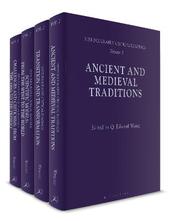
|
Historiography: Critical Readings
Mixed media product
Main Details
| Title |
Historiography: Critical Readings
|
| Authors and Contributors |
Edited by Professor Q. Edward Wang
|
| Series | Critical and Primary Sources |
|---|
| Physical Properties |
| Format:Mixed media product | | Dimensions(mm): Height 244,Width 169 |
|
| Category/Genre | World history |
|---|
| ISBN/Barcode |
9781350086876
|
| Classifications | Dewey:907.2 |
|---|
| Audience | | Tertiary Education (US: College) | |
|---|
|
Publishing Details |
| Publisher |
Bloomsbury Publishing PLC
|
| Imprint |
Bloomsbury Academic
|
| Publication Date |
25 February 2021 |
| Publication Country |
United Kingdom
|
Description
Q. Edward Wang's unparalleled four-volume survey of historiography examines the nature and significance of history writing from ancient worlds to the present day. Taking a global approach, it presents and contextualizes classic works that portray the traditions of historical writing around the world. The collection also incorporates key essays and articles from the 18th century to the present that analyze the continuities and transformations that have existed and taken place within those traditions. Edited by a world-renowned, leading scholar in the field, the four volumes cover the ancient and medieval eras, the Renaissance period through to the 18th century, the rise of the Rankean school and 'scientific history' in the West, and new developments in worldwide historiography from the 1990s to the present day. As well as substantial contextualizing editor introductions for each volume, there are 60 individual essays and extracts included across the set, with notions of time, antiquarianism, the Annales School and postcolonialism all key topics at the heart of this vital collection. This is an essential resource for all scholars interested in historiography and the development of history as a discipline.
Author Biography
Q. Edward Wang is Professor of History at Rowan University, USA. He won a Faculty Research Achievement Award at Rowan in 2013 and received Changjiang Professorship at Peking University in China, which he has held since 2007. He has published extensively on historical theory, history of historiography, Asian cultural and intellectual history and comparative history and historiography including A Global History of Modern Historiography (co-authored with Georg G. Iggers & Supriya Mukherjee, 2008 & 2017) and Marxist Historiographies: A Global Perspective (co-edited with Georg G. Iggers, 2015), amongst others.
ReviewsOver the past quarter century, the study of historiography has been globalized and expanded well beyond older accounts that focused principally on European-based traditions of historical writing. Often simply considered as the analysis of writings about particular problems or events and taken as an add-on or adjunct to "real" history, it has become a serious historical subfield in its own right-in a sense, the discipline's theoretical and historical meta-field. As a result, there are now several recent textbooks, encyclopedias, monographs, and book series available to students, professional historians, and others interested in the subject. Yet some of the most incisive and thought-provoking historiographical studies of the past four decades have appeared not in book form but in a range of academic journals from around the world-not all of which are always readily accessible outside major research libraries. Q. Edward Wang has used his extensive experience of teaching, critically thinking about, and prolifically writing on historiography to select some of the best historiographical scholarship to be produced since the 1980s for reprinting. They appear here with the added benefit of Prof. Wang's substantive introductions to each of four chronologically-arranged volumes that cover writings on subjects ranging from antiquity to the present, and with an ambitiously global geographic range. With this handsome set, Bloomsbury continues to establish itself as a major publisher of scholarship focusing on the history, nature, and changing social role of human study of the past. * Daniel Woolf, Professor of History, Queens University, Canada *
|